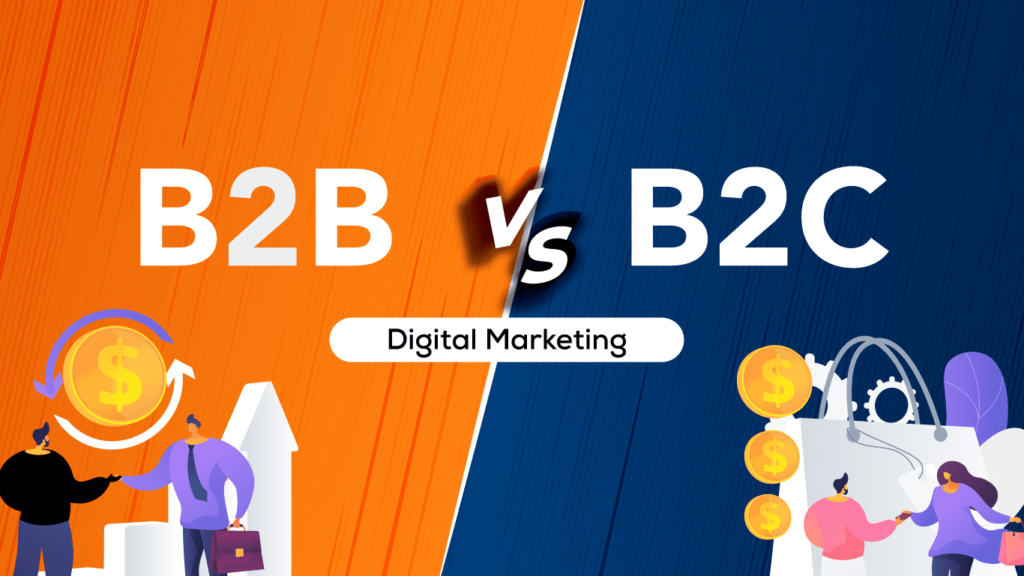What is B2B Marketing ?
This marketing focus on selling products or services to other businesses, It involves building relationships with decision makers such as managers and executives who are responsible for making purchasing decisions Example a company selling accounting software would use B2B marketing to showcase the efficiency and reliability of their solution B2B & B2C in Digital Marketing.
Key Characteristics of B2C Marketing
- Longer decision-making cycles
- A focus on building long term relationships
- Content that emphasizes expertise trust and solutions
- Smaller more niche target audiences

Major Differences Between B2B and B2C Marketing
1 Target Audience
The primary difference lies in who the marketing is aimed at
- B2B: Targets businesses decision-makers and professionals The audience is smaller and more specialized
- B2C: Targets individual consumers The audience is larger often spanning various demographics
2 Buying Journey
The customer journey in B2B marketing is typically more complex It involves:
- Research
- Multiple approvals
- Budget considerations
On the other hand B2C buying decisions are quicker They’re often driven by impulse or emotional triggers
3 Messaging Tone
- B2B: Focuses on professionalism logic and data The tone is formal and emphasizes expertise
- B2C: Focuses on emotions lifestyle and trends The tone is casual and relatable
4 Marketing Channels
The platforms used to reach audiences also vary:
- B2B: Primarily uses LinkedIn webinars email campaigns and industry blogs These channels help establish authority and trust
- B2C: Relies on platforms like Instagram Facebook YouTube and TikTok These are visually-driven platforms perfect for engaging storytelling
Content Strategies for B2B vs B2C
B2B Content Strategy
B2B marketing relies heavily on informative and educational content Common formats include:
- Whitepapers and case studies
- E-books and in-depth guides
- Industry reports
- Webinars and online demos
This type of content helps businesses showcase their expertise and build credibility The goal is to address specific pain points and provide actionable solutions
B2C Content Strategy
B2C marketing focuses on entertaining and visually engaging content Popular formats include:
- Short videos and reels
- Social media posts and ads
- Product reviews and testimonials
- Email promotions
The focus is on creating a fun and engaging experience that resonates emotionally with the audience
Role of Personalization
Personalization is crucial in both B2B and B2C marketing but the approach differs
- B2B: Personalization means crafting tailored messages for individual businesses addressing their unique needs and challenges
- B2C: It involves targeting consumers based on their preferences behavior or purchase history often using dynamic content or recommendations
Customer Relationships
B2B marketing prioritizes long-term relationships It often involves nurturing leads over months or even years ensuring the client feels valued and supported In contrast B2C marketing is typically about one-time transactions or repeat sales driven by quick satisfaction and strong brand loyalty
KPIs and Metrics
Key performance indicators vary significantly between B2B and B2C
- B2B KPIs: Include lead quality conversion rates and ROI from campaigns
- B2C KPIs: Focus on engagement metrics such as clicks shares and sales volume
For example:
- A B2B company might analyze how many leads turned into contracts
- A B2C company might track how many products were sold from a social media ad
Challenges in B2B and B2C Marketing
B2B Challenges
- Longer sales cycles requiring more patience
- Need for in-depth knowledge of the industry
- Building trust with highly informed decision-makers
B2C Challenges
- Capturing attention in a crowded market
- Staying relevant amidst fast-changing trends
Building emotional connections with diverse audiences
Similarities Between B2B and B2C Marketing
While they have their differences B2B and B2C marketing share some similarities:
- Both rely on data-driven strategies
- Personalization is key for success
- A strong digital presence is non-negotiable
- Both aim to provide value to their audience albeit in different ways